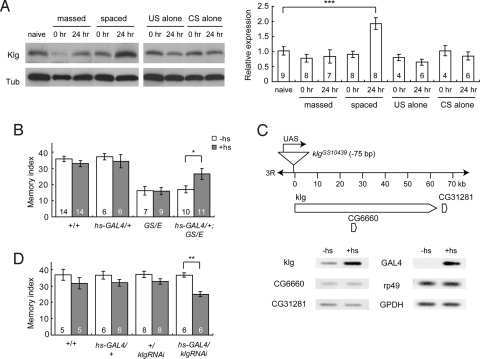Fig. 2.
Klg increases upon LTM induction and LTM depends on Klg expression. (A) Klg protein amounts, measured from fly head extracts, increase significantly 24 h after spaced training (***, P < 0.001), but not after massed training or after spaced application of the unconditioned stimulus (US) or conditioned stimuli (CS) alone. The ratio of Klg to α-tubulin (Tub) protein in naive flies was defined as 1.0. (B) A 37 °C heat-shock (+hs) for 15 min significantly improved 1-day memory after spaced training in hs-GAL4/+;klgGS10439/klgE226 (hs-GAL4/+;GS/E) flies (*, P < 0.04), indicating that the klg memory defect can be complemented by conditional expression of klg+. (C) Comparison of the expression of P-UAS downstream gene transcripts in hs-GAL4/+;klgGS10439/+ flies 3 h after the heat-shock (+hs). While heat-shock enhanced the expression of klg and GAL4 transcripts, it did not alter the expression of two other downstream genes, CG6660 and CG31281. RNA was isolated from Drosophila whole bodies and transcripts were quantified by semiquantitative RT-PCR. (D) RNAi-mediated silencing of klg disrupts LTM. A 37C°C heat-shock (+hs) for 30 min significantly disrupted 1-day memory after spaced training in hs-GAL4/UAS-klgRNAi (hs-GAL4/klgRNAi) flies (**, P < 0.005).

